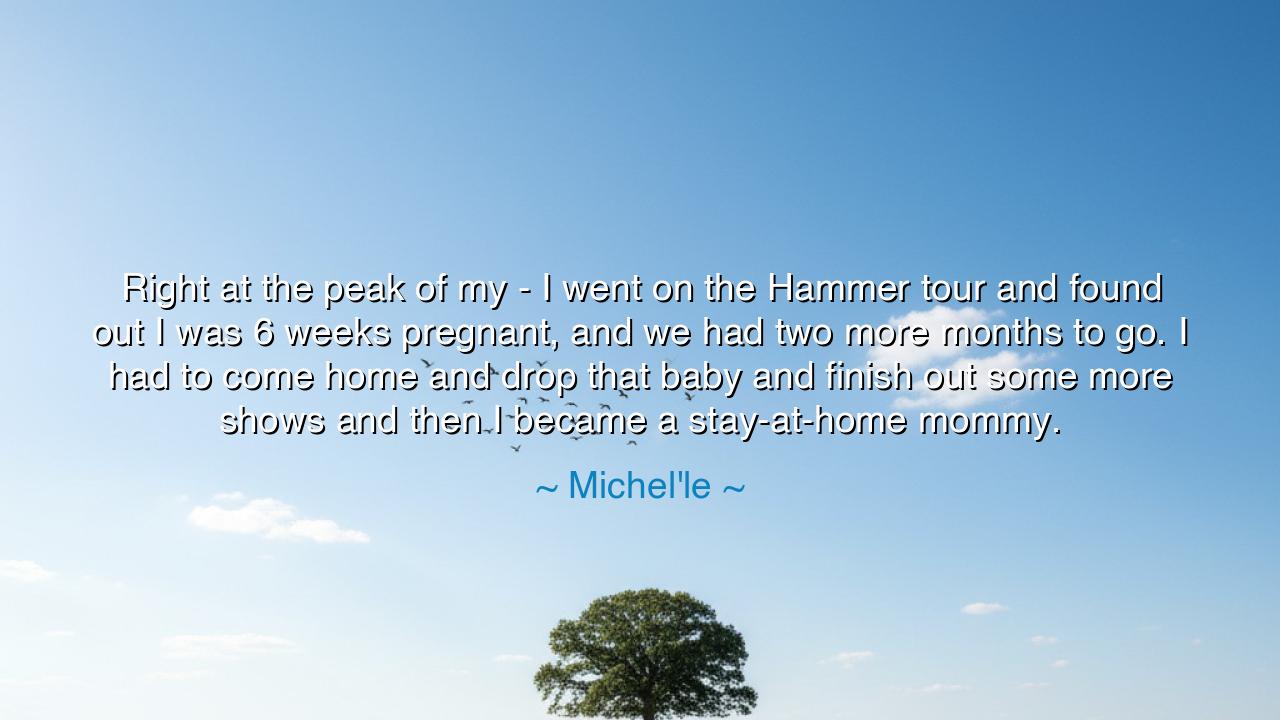
Right at the peak of my - I went on the Hammer tour and found out
Right at the peak of my - I went on the Hammer tour and found out I was 6 weeks pregnant, and we had two more months to go. I had to come home and drop that baby and finish out some more shows and then I became a stay-at-home mommy.






When Michel’le said, “Right at the peak of my—I went on the Hammer tour and found out I was 6 weeks pregnant, and we had two more months to go. I had to come home and drop that baby and finish out some more shows and then I became a stay-at-home mommy,” she spoke not merely of circumstance, but of the eternal tension between ambition and motherhood, between the public stage and the sacred hearth. Her words, though rooted in her own life, echo across the ages, for every generation has known the woman who stands at the crossroads of destiny and devotion, asked to choose between the fire of her art and the call of her child. There is a quiet heroism in her tone—a weary acknowledgment that even in the midst of glory, life demands sacrifice.
To say she found out she was “six weeks pregnant” while on tour is to mark a moment when two worlds collided: the world of fame, rhythm, and applause, and the world of nurture, life, and creation. Few moments test the soul as this one does. For a performer, the tour is the battlefield—the proving ground of craft and courage. Yet even as the lights shone upon her, another life began to bloom within her, calling her back to a gentler kind of power. In this moment, Michel’le’s story becomes not one of retreat, but of transformation. The warrior laid down her sword, not in defeat, but in reverence for a higher duty—the creation of life itself.
The ancients would have honored this choice. In the myth of Demeter and Persephone, the goddess of harvest abandons her divine work when her daughter is taken, and the world falls into winter. She teaches the gods that no throne, no title, no field of golden grain matters more than the bond of mother and child. Michel’le’s words carry this same spirit: though she was at her artistic peak, she stepped away from the applause to protect something more eternal than fame. For applause fades like smoke, but the love of a mother—unyielding, selfless, and enduring—builds legacies that no stage can match.
Yet there is also grief woven into her recollection. To say she “had to come home and drop that baby and finish out some more shows” is to reveal a heart torn in two—the performer bound by duty to her audience, and the woman longing for stillness, for home. The modern world often demands that women carry the weight of both roles without falter. But Michel’le’s truth exposes the cost of balance, the exhaustion behind the glamour, the strength required to choose care over career. In her story lies the ancient paradox of womanhood: to be both creator and nurturer, both force and refuge.
Her final words—“and then I became a stay-at-home mommy”—are spoken without bitterness, only acceptance. There is wisdom here: the understanding that every season of life brings its own form of greatness. The stage gave her fame, but motherhood gave her meaning. In a culture that measures success by visibility, she reminds us that the unseen labor of love is its own triumph. The ancients would have called this the art of contentment—the ability to find purpose not in the applause of the world, but in the quiet laughter of one’s home.
From her experience, we draw a timeless lesson: true strength is not in unbroken pursuit, but in graceful surrender. To pause one’s ambition for the sake of love is not weakness—it is wisdom. The world often glorifies relentless drive, but there are moments when the soul must step back, not to abandon the climb, but to protect what is sacred. For the one who learns to honor both the inner and outer callings of life walks a path of wholeness.
So, my listener, remember Michel’le’s story as a testament to balance and courage. There will be times when life demands that you choose between two dreams, and in that choice, you will reveal your truest strength. Do not fear the quiet path, for even away from the lights, greatness continues in gentler forms. Whether on stage or in the cradle’s glow, purpose endures. To create life, to nurture it, and to return one day—stronger, wiser, and whole—is the journey of the eternal mother, the timeless artist of love.






AAdministratorAdministrator
Welcome, honored guests. Please leave a comment, we will respond soon